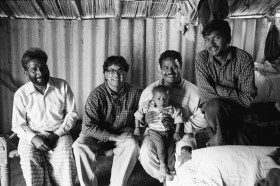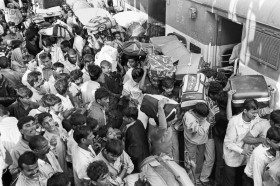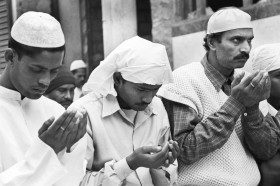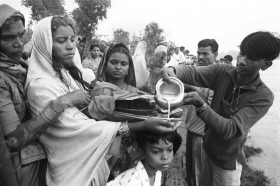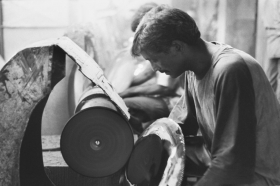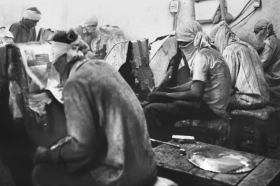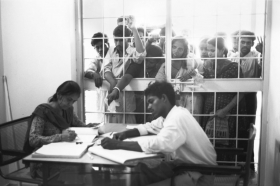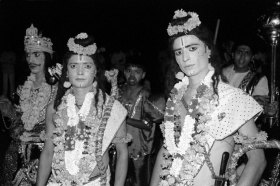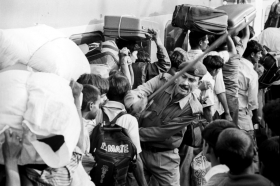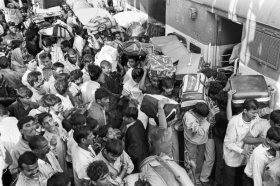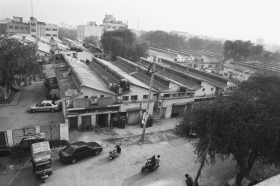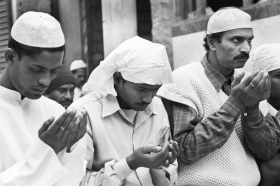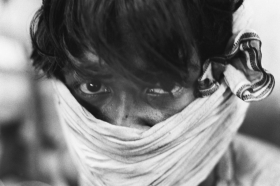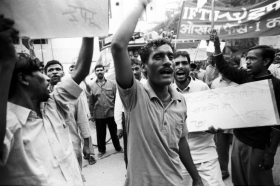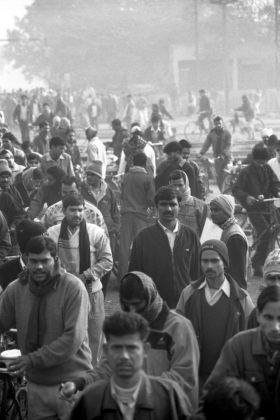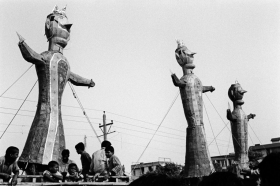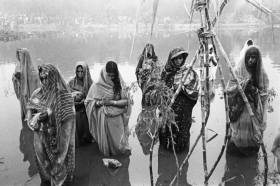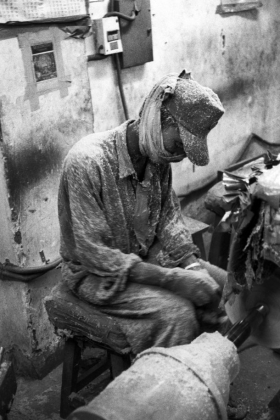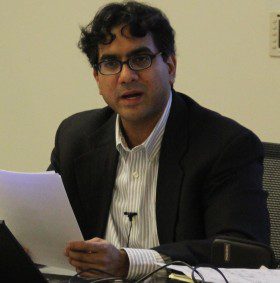
At the South Asia Without Borders Seminar in December
Shankar Ramaswami is halfway through his year as SAI’s South Asian Studies Fellow. In addition to his involvement with SAI seminars and working on a book about his fieldwork in India, he is teaching a class this spring semester titled ‘South Asian Studies 196: Work and Religion in Modern South Asia.’
SAI caught up with Ramaswami to talk about his upcoming class, as well his experience as an SAI Fellow.
He explained that the class seeks to address two fundamental questions: What is the nature of the experiences, struggles, and visions of poor and working people in modern South Asia? What are the appropriate categories, imageries, and vocabularies for understanding these lives and visions? The answer that the class will present is that we need a different vocabulary than the current dominant ideologies of neoliberalism, liberalism, and Marxism.
Although a theme of recent writing is that of India suffering, Ramaswami explained that the picture he will present in his class is more complex: “Yes, there is material deprivation, difficult and dangerous work, mental tension, spiritual emptiness,” he explained. “But there are also other things: humor, collectivity, integrative filaments in neighborhoods, and struggles for justice.”
Drawing on this complexity, his work hopes to “develop a grounded immanent critique of neoliberal capitalism in South Asia.” Although much of the material for the course is focused on India, he said that many of the themes in the course – factories, labor, workers, religion – resonate broadly across South Asia. The lessons from the class can be applied to working people in many cities, for example, the struggle of garment workers in Bangladesh.He is currently working on a book on his fieldwork about his experience living and studying factory workers in India. Several chapters from his manuscript will serve to anchor the course. Students will also have the chance to participate in Skype conversations with scholars, filmmakers, and activists. Parimal Patil, Professor of Religion and Indian Philosophy and Chair of the Department of South Asian Studies, will be actively involved in the sections of the course on religion and philosophy.
Other than sources such as scholarly work, literature, nonfiction and film, Ramaswami plans to integrate some of his own photography from his time doing fieldwork in India. By using mostly black and white photography, he said it helps to “provide some kind of direct vision” to help the viewer understand the subject matter and context more deeply.
Photography is not the only skill that he plans to integrate into the class. He hopes to show how his background in music as a percussionist has influenced his work: “Music experience plays into this whole narrative… because music is about listening and finding resonances and dissonances,” he said. “Music has an affinity with the narrative form, and also I think that music, and certain words from music, have come into my work.”
Although the class is part of the Department of South Asian Studies, Ramaswami said that the class will appeal to students from many disciplines: anthropology, religion, social studies, history, economics, government, public policy, and more. Mostly, he said, students should be interested in the lives of poor and working people. This can include students who are “troubled by the trajectory of capitalism, bothered by poverty and inequality, concerned about where the products that one consumes in the West come from, and also has a concern or interest in general with questions of justice, but also the increasing importance of nonsecular vocabularies and visions in the modern world,” he said. A background in South Asian Studies is not necessary.
Involvement as an SAI Fellow
As SAI’s Raghunathan Family Fellow for the 2013-2014 academic year, Ramaswami has been able to use SAI’s resources, as well as Harvard’s, to enhance his research on these themes. While talking about his involvement in SAI’s activities so far, he mentioned three events during the fall semester that were highlights.
His participation in SAI’s Annual Mahindra Lecture with Raghu Rai gave him the opportunity to learn more about Rai’s approach to photography, which has inspired his own strong interest in capturing peoples’ lives in photos. This will be integrated into his class. He recalled one quote of Rai’s in particular: “Don’t call yourself an amateur, call yourself a soulful person, so whatever you do, you will do it well, with passion and intensity,” Rai said at the event.
Ramaswami also had the opportunity to be on the panel for a SAI Social Enterprise Seminar titled ‘Growth, Employment, and Poverty in India: A Gender Perspective’ with Maitreyi Bordia Das of the World Bank and Marty Chen of HKS. He also lead a SAI South Asia Without Borders Seminar titled ‘Chakravyuh (Lotus Maze): Travails, Entanglements, and Visions of Migrant Workers in Delhi,’ which was based on a chapter from his book, in which Parimal Patil served as the chair.
Aside from SAI activities, Ramaswami said that he has been able to attend many events related to South Asia at the Kennedy School, Divinity School, and the South Asian Studies Department. Since he has a broad interest in South Asia, he said his time at Harvard has given him “the chance to get involved with different types of discourse on South Asia.” He was previously a Visiting Associate Fellow at the Centre for the Study of Developing Societies in Delhi, after having spent time doing fieldwork in India.
This spring, aside from teaching his course, Ramaswami will be involved in several SAI activities, including a seminar with Uday Mehta titled ‘Gandhi on Courage, Ethics and Society.’
Click on the gallery below to see more of Ramaswami’s photography. Read his bio here.
The deadline for SAI’s Fellowships is March 1, 2014.

